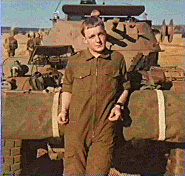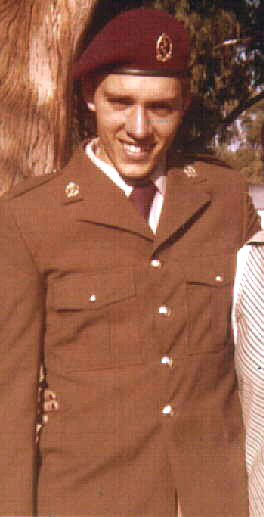Chapter Two
South African Medical Service, Voortrekkerhoogte
David and I reported at Milner Park Station, Johannesburg on the sunny but crisp and cold early morning of Wednesday, 5 July 1978, together with hundreds of other young men from the Witwatersrand area. Here we were to catch a troop train which was already lined up, empty and ready to transport us to Voortrekkerhoogte. We were allowed to mill around for a while and make our last farewells, and many a tear was shed by mothers and girlfriends, although my own fiancee was working and could not see us off. I felt miserable and depressed, and would've been happy if the earth had swallowed me up then.
I already had some idea of the nature of what to expect, as my good friend Gavin Schmidt had gone into the army in January, at 1 Special Services Battalion (1 SSB) in Bloemfontein, and we had kept up a semi-regular correspondence throughout his basic training. He'd filled me with all the horror stories of `afkak', or punishments meted out to the recruits, and consequently I was very nervous, as was my poor mother, who was there to see us off at the station. I didn't give it much thought at the time, but at the relatively young age of 39 (younger than I am now at the time of writing), she was seeing off both of her sons to an uncertain future in the Army.
We boarded eventually and, with much waving from the windows, watched our families disappear around the bend as the train began its journey to Voortrekkerhoogte.
I had tried to give up smoking cigarettes about a month before my reporting date, and had so far succeeded, but I was so stressed that when some kind soul sitting near me on the train offered me a cigarette, I gratefully accepted and puffed away, to try and ease my fears, which were quite intense by this stage. So far we had been treated decently by the few soldiers, mostly NCO's, who were there to get us on the troop train, and they generally left us alone during the journey, no doubt aware of the reception we had waiting for us. We were all ignorant! This all changed once we reached our destination.
We pulled up into the siding at Voortrekkerhoogte, and were immediately ushered off the train to the accompaniment of much shouting and arm waving by a second group of NCO's, there to greet us. In short order we were placed into squads, based on which unit we were assigned to, and then chased onto waiting Bedford trucks, the start of the infamous `roofie ride'. I might explain here that a `roof', `rower' or `roofie', was the term given to a new conscript.
The Bedfords had hard wooden benches located along the centre line of the truck, and you sat on these back to back, without a restraint of any kind, clutching your worldly possessions while the drivers took sadistic delight in trying to drive over every pot hole, bump or ditch they could find in the roads. Luckily for David and I, we were headed for SAMS training centre, which was one of those closer to the station, and we were soon there and being disembarked. What followed I can only describe as chaos, with little organisation being apparent wherever one looked or went.
As I recall, the camp was laid out in a long rectangular shape. There were barracks or huts further back but the first thing you came to was a large hall and an open area, probably the parade ground. We were dropped off and chased off to the huts, being told to claim a bed each. This we did, and it was during this mad scramble that David and I became separated, and I ended up in a barracks, Bungalow 435 East, without anyone I knew. This was to have profound effects in the next few days, but I was not to know this at the time of course.
Once we had dropped off our gear, we were unceremoniously despatched to the stores, where we were issued with a trommel, which is a large metal chest, and a couple of blankets and a greatcoat, but as yet no uniform or other equipment. These I was grateful for, as the beds we had in the barracks consisted of a metal frame with a foam mattress, completely devoid of sheets or any mattress covering, and it was a cold winter.
I was so far quite surprised by how mild the reception had been, when compared with my friend Gavin's description of his own experiences at 1 Special Services Battalion in Bloemfontein. Although the Corporals who were doing the organising were quite brusque, they were not unkind as yet. Again, I was to be rudely shocked out of my sense of complacency.
On 7 July, having been in the army for barely 48 hours, I and a number of others were moved out of the bungalow we had been in, and allocated a tent, off to one side of the main barracks area.
For the next few days we either sat around and became incredibly bored, or ran around like mad things, fetching kit and doing medical examinations. In my own tent, I made a firm friend, whose name I now sadly cannot recall, but he and I were inseparable at the time. I think again that this was out of a sense of neediness on both our parts. My friend had suffered the misfortune to contract cancer in a kidney in his childhood, necessitating its removal, but as unlucky as this was, it was to be a stroke of good luck for him in the army. I also discovered that an old school friend, Joseph Meadows, was in the same intake, and was in Bungalow 437 East. It was nice to see a familiar face again.
All of the medical examinations were undertaken in the hall mentioned previously, and were done in assembly line fashion. The room was ringed with a number of tables, each manned by a doctor or other medical professional, and each of them checked a different part of your anatomy. For example, one would test your eyesight, while another would test your reflexes, and another your hearing etc.. You were given a form, which was filled in by these people as you went around to each table, and at the end of it all, you saw a senior doctor who questioned you regarding your general health, or any health problems you might have which would prevent you from completing military service. At the end of it all, they gave you a medical classification, depending on how your examination had gone.
In my own case, I was made to do sit ups, press ups, run on the spot, and walk a few paces, while I had my ears nose and throat, eyes and every other part of me closely examined. When I saw the senior doctor, I told him about an old broken collar bone injury, suffered in 1977 while playing rugby, which had left me with a decidedly lopsided appearance. Because the two halves of the fractured collar bone had healed on top of one another, my one arm was approximately an inch closer to my body than the other, where the unbroken collar bone was now that much longer. He got me to do a few more push ups, mumbled to himself and declared my medical classification to be G2 K1. I had no idea what this meant at the time, so as soon as we were finished our examinations, my friend and I asked the Corporal in charge of our group. My friend, by the way, had told them that he only had a single kidney after his childhood brush with cancer, and had been classified as G4 K4.
I will always remember the Corporal's simple but direct response when I asked him what G2 K1 meant - "Reg vir opfok" (Right, or medically fit, to be fucked up)! My friend, it seems, was not "reg vir opfok". In fact, his classification of G4 K4 was so low that he was considered to be a distinct health risk, and although he was to stay in the army, he was to do no basic training, and could only be assigned to a base very close to a hospital or similar medical facility. Talk about lucky! I didn't envy him his cancer, but I sure did envy his G4 K4 classification in the army. Shortly after this, he was transferred from SAMS to PSC, or Personnel Services Corps, and assigned to a desk job in Voortrekkerhoogte, and I never saw him again.
During that first week in the army I began to notice that those of us in the tent were not being integrated as much as the majority of new recruits were. For a start, we had still not been issued with uniforms and other equipment, whereas my brother David and Joseph Meadows had been. They had also been assigned to specific platoons, each platoon being assigned to a barracks, and had been issued with uniforms and shown how to soften their new boots by pouring boiling water into them and then working the leather with their hands. The few of us outcasts, about 30 in number, had been left to our own devices mostly and we were still relying on the one greatcoat and two blankets for any warmth, day or night.
A number of wild rumours began circulating about our ultimate fate, but the most credible one was that we were surplus to requirements at SAMS, and were being transferred to the infantry. This was a devastating blow to my ambitions to be near my brother, but I was strangely excited at the prospect of joining the infantry, as these were the men who did the real fighting. In hindsight, it was a very naive viewpoint to have, borne about by my youth and ignorance, and I am extremely glad today that this rumour turned out to be false and I was not transferred to the infantry. I do believe that this was the original plan and that we would have been, but for the fact that the infantry schools were all located away from Voortrekkerhoogte and transport for 30 odd extras to these units was something of a problem for SAMS. Instead, on Tuesday 11 July, we were summarily rounded up, put back on a truck manned by soldiers with light blue berets, and driven off through the main gate at SAMS, to where we knew not.


My best friend Gavin Schmidt (left), who served with 1 SSB from January 1978 to December 1979 and my brother David (right), who served in SAMS stores in Pretoria between July 1978 and June 1980.
Hotlink to the Next Chapter.
Published at Sentinel: 24th July 2006. Here is a shortcut back to

